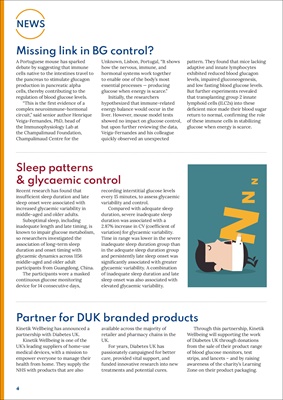
4
NEWS
Missing link in BG control?
A Portuguese mouse has sparked
debate by suggesting that immune
cells native to the intestines travel to
the pancreas to stimulate glucagon
production in pancreatic alpha
cells, thereby contributing to the
regulation of blood glucose levels.
"This is the first evidence of a
complex neuroimmune-hormonal
circuit," said senior author Henrique
Veiga-Fernandes, PhD, head of
the Immunophysiology Lab at
the Champalimaud Foundation,
Champalimaud Centre for the
Unknown, Lisbon, Portugal, "It shows
how the nervous, immune, and
hormonal systems work together
to enable one of the body's most
essential processes - producing
glucose when energy is scarce."
Initially, the researchers hypothesized
that immune-related energy balance
would occur in the liver. However,
mouse model tests showed no
impact on glucose control, but
upon further reviewing the data,
Veiga-Fernandes and his colleague
quickly observed an unexpected
pattern. They found that mice lacking
adaptive and innate lymphocytes
exhibited reduced blood glucagon
levels, impaired gluconeogenesis,
and low fasting blood glucose levels.
But further experiments revealed
that transplanting group 2 innate
lymphoid cells (ILC2s) into these
deficient mice made their blood sugar
return to normal, confirming the role
of these immune cells in stabilizing
glucose when energy is scarce.
Sleep patterns
& glycaemic control
Recent research has found that
insufficient sleep duration and late
sleep onset were associated with
increased glycaemic variability in
middle-aged and older adults.
Suboptimal sleep, including
inadequate length and late timing, is
known to impair glucose metabolism,
so researchers investigated the
association of long-term sleep
duration and onset timing with
glycaemic dynamics across 1156
middle-aged and older adult
participants from Guangdong, China.
The participants wore a masked
continuous glucose monitoring
device for 14 consecutive days,
recording interstitial glucose levels
every 15 minutes, to assess glycaemic
variability and control.
Compared with adequate sleep
duration, severe inadequate sleep
duration was associated with a
2.87% increase in CV (coefficient of
variation) for glycaemic variability.
Time in range was lower in the severe
inadequate sleep duration group than
in the adequate sleep duration group
and persistently late sleep onset was
significantly associated with greater
glycaemic variability. A combination
of inadequate sleep duration and late
sleep onset was also associated with
elevated glycaemic variability.
Partner for DUK branded products
Kinetik Wellbeing has announced a
partnership with Diabetes UK.
Kinetik Wellbeing is one of the
UK's leading suppliers of home-use
medical devices, with a mission to
empower everyone to manage their
health from home. They supply the
NHS with products that are also
available across the majority of
retailer and pharmacy chains in the
UK.
For years, Diabetes UK has
passionately campaigned for better
care, provided vital support, and
funded innovative research into new
treatments and potential cures.
Through this partnership, Kinetik
Wellbeing will supporting the work
of Diabetes UK through donations
from the sale of their product range
of blood glucose monitors, test
strips, and lancets - and by raising
awareness of the charity's Learning
Zone on their product packaging.